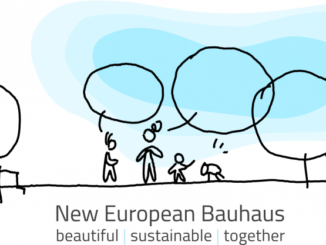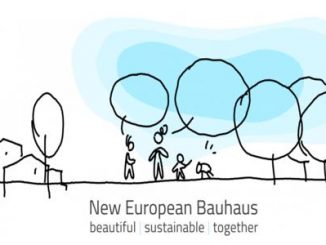
Bruxelles, 9 giugno 2022 – A partire da oggi la Commissione organizza il primo festival dedicato al nuovo Bauhaus europeo (NBE). Concepito intorno a tre pilastri, Forum (convegno), Fair (fiera) e Fest (festa), con sede fisica a Bruxelles, alla Gare Maritime e al Mont des Arts, ma anche online, il festival del nuovo Bauhaus europeo è stato pensato insieme alla comunità NBE per presentare, celebrare e sviluppare il movimento.
Accanto al ricco programma di Bruxelles, il festival propone oltre 200 eventi collaterali in tutta Europa, nati da progetti di creazione condivisa e organizzati autonomamente dai partner. La Presidente Ursula von der Leyen inaugura ufficialmente il festival oggi alle ore 13.00 CET a Roma, presso il MAXXI (Museo Nazionale delle arti del 21º secolo), in collegamento diretto con Bruxelles.
Forum, Fair e Fest a Bruxelles
Il Forum è un convegno articolato in tre giornate di formati partecipativi, dalle tavole rotonde ai colloqui in stile TED. La presidente Ursula von der Leyen e i commissari Johannes Hahn, Mariya Gabriel, Elisa Ferreira e Kadri Simson orienteranno le discussioni in un’ottica europea. Tra gli oratori vi saranno personalità di fama mondiale, tra cui importanti architetti come Francis Kéré, Shigeru Ban, Rem Koolhaas e Stefano Boeri, esponenti del mondo dell’arte come Gerfried Stocker (Ars Electronica), artisti del suono come Emeka Ogboh, la presidente della Fondazione MAXXI Giovanna Melandri, la scrittrice e attivista Hilda Nakabuye nonché scienziati come Hans Joachim Schellnhuber, Stefano Mancuso e Carlos Moreno (15 min city). Parteciperanno diversi politici nazionali di primo piano, come Elke van den Brandt (ministro della Mobilità della regione di Bruxelles-Capitale), Philippe Close (sindaco di Bruxelles) e Zdeněk Hřib (sindaco di Praga).
Nel corso del Forum, l’11 giugno, saranno assegnati i prestigiosi premi del nuovo Bauhaus europeo per le quattro categorie NBE: “Rientrare in contatto con la natura”; “Riconquistare il senso di appartenenza”; “Dare la priorità ai luoghi e alle persone che ne hanno più bisogno” e “Costruire un ecosistema industriale circolare e sostenere il concetto di ciclo di vita”. Alla cerimonia parteciperanno i progetti finalisti.
La sezione Fair del festival mette in vetrina progetti rientranti nello spirito dell’NBE, che ad esempio vedono il coinvolgimento di laboratori cittadini locali in veste di capofila per attività di ricerca finanziate da programmi UE come Orizzonte Europa. Saranno inoltre esposti prototipi di invenzioni volte a migliorare la sostenibilità, l’inclusività e la qualità delle nostre esperienze quotidiane. La fiera è basata sulla creazione condivisa: su un totale di 316 candidature pervenute, sono stati selezionati 100 progetti da esporre nel quadro dell’NBE, sia su supporti fissi che mobili (con biciclette e tuk-tuk elettrici) dislocati in tutto il centro di Bruxelles.
Infine, la sezione Fest è una celebrazione dell’NBE aperta al grande pubblico. Il Mont des Arts, situato nel centro di Bruxelles, da oggi a domenica appartiene interamente all’NBE: il programma, studiato per attirare diversi tipi di pubblico, prevede spettacoli di danza e teatrali, installazioni e concerti (tra i protagonisti il popolare gruppo artistico ucraino Patsyki Z Franeka e l’artista ungherese Дeva, vincitrice del premio Music Moves Europe 2022), nonché esperimenti scientifici, laboratori di riutilizzo creativo e molto altro ancora. Al Forum parteciperanno anche artisti e operatori culturali.
Oltre 200 eventi collaterali in Europa
Tra gli eventi collaterali organizzati dalla comunità NBE in 25 paesi figurano discussioni sulle risorse rinnovabili, sulle tecnologie innovative, sull’agricoltura urbana, sull’evoluzione degli edifici e sulla mobilità rispettosa del clima. Si terranno inoltre concerti, laboratori di idee e mostre; il programma completo si trova sul sito web del festival. Durante la cerimonia di apertura sono previsti collegamenti in diretta con dieci di questi eventi collaterali.
Dichiarazioni di membri del Collegio
La Presidente della Commissione europea Ursula von der Leyen ha dichiarato: “Il nuovo Bauhaus europeo rende possibili cambiamenti tangibili sul terreno per conseguire i nostri obiettivi climatici e migliorare la qualità della vita nelle nostre città, nei nostri villaggi e nelle nostre regioni. Il festival è una meravigliosa opportunità per approfondire le discussioni e incontrare coloro che sono impegnati nella costruzione di un futuro sostenibile, inclusivo e bello.”
Mariya Gabriel, Commissaria per l’Innovazione, la ricerca, la cultura, l’istruzione e i giovani, ha dichiarato: “Gettando un ponte tra la scienza e l’innovazione da una parte e l’arte e la cultura dall’altra, il festival del nuovo Bauhaus europeo rappresenta un’eccellente opportunità per interagire, condividere progetti e idee innovative e mettere il Green Deal europeo al centro della nostra attenzione. Il festival riunirà persone di ogni estrazione sociale per discutere e costruire un futuro sostenibile, inclusivo e attraente.”
Elisa Ferreira, Commissaria per la Coesione e le riforme, ha dichiarato: “Nella nostra ricerca di luoghi sostenibili e attraenti abbiamo bisogno di inclusività. Il nuovo Bauhaus europeo ha l’ambizione di raggiungere tutti i territori: apporta energia positiva ai nostri sforzi collettivi per un futuro migliore insieme!”
Contesto
Il nuovo Bauhaus europeo, lanciato dalla presidente von der Leyen nel settembre 2021, aggiunge una dimensione culturale al Green Deal e accelera la transizione verde con cambiamenti tangibili sul terreno.
Il festival porta il Green Deal europeo alla ribalta della nostra vita quotidiana. Transdisciplinare per natura, l’NBE invita architetti, progettisti, artisti, scienziati, ingegneri, artigiani e cittadini a condividere le loro competenze per aiutarci a preparare il nostro futuro.
Per ulteriori informazioni
Festival del nuovo Bauhaus europeo
Pagina web del nuovo Bauhaus europeo
Premi del nuovo Bauhaus europeo 2022
…………..
Il discorso pronunciato dalla Presidente Ursula von der Leyen oggi a Roma per inaugurare la prima edizione del festival del nuovo Bauhaus europeo.
Speech by President von der Leyen at the Opening Session of the
Conference “Reconstructing the Future for People and Planet – a New
European Bauhaus Initiative”, organised by the Pontifical Academy of
Sciences
Rome, 9 June 2022
Dear Dr. von Braun,
Your Eminence, Cardinal Turkson,
Lieber John Schnellnhuber,
Ladies and Gentlemen,
I am so glad to be here today. At the Pontifical Academy of Sciences where a commitment to science
and progress meets a devotion to values.
It is a real honour that you put the New European Bauhaus at the centre of your conference. It shows
how impactful the initiative already is: not just in finding inspiring solutions to climate change, but
also in helping to improve people’s lives in the way we design and build our homes and cities. This is
how change happens in democratic societies: from the bottom up, where everyone can be a part of
the solution.
Like the Pontifical Academy, the New European Bauhaus is guided by values. And it is three
principles in particular that I would like to speak about today.
The first principle is sustainability. People of faith believe that Creation was entrusted to us, human
beings, but does not belong to us. Our responsibility is to preserve it, to take care of it, and pass it
on to future generations. But for too long, humanity has forgotten this responsibility. Generation
after generation has exploited nature beyond our planet’s boundaries. We took, we polluted, we
disposed. And this has to stop. We need a new model, which gives back to nature instead of taking
away from it. This is the European Green Deal. We want to make Europe the first climate-neutral
continent by 2050. We have put this ambition into binding law.
As a highly innovative and industrialised region, Europe can show that it can be done: Create a
circular economy that intrinsically values nature and human health. That there is no trade-off
between economic growth and cutting carbon emissions. And that our societies can flourish, without
putting future generations at risk. Professor Schnellnhuber spoke about the importance of the
construction sector in the green transition. Buildings are responsible for nearly 40% of Europe’s
carbon emissions. This is more than the CO2 emissions of the entire Japanese economy. That is why
one of the first strategies we put forward as part of the European Green Deal was a renovation wave.
It is backed with 53 billion euros from our recovery plan, NextGenerationEU.
The New European Bauhaus works like an incubator for this plan. We need to bring nature back into
our cities. Take our new European research centre in the southern Spanish city of Sevilla. Just
recently, the European Commission gave the go-ahead for this new building. It will house over 400
international scientists. The building will not just be fully carbon neutral, but energy positive. This
means that the extra renewable electricity it generates can be stored and even shared back into the
grid. A building that gives back more than it takes. This is the power of green innovation.
But the New European Bauhaus goes further. We believe that everything we make, everything we
build should not just strive for functionality, but also for beauty. This brings me to the second
principle of the New European Bauhaus:
Humans need beauty to thrive. And here I’m not just talking about aesthetics. I’m also taking about
another kind of beauty: the quality of life. There is a project in Luxembourg that recently won a
Bauhaus prize: A new building for a day-care centre and primary school. It was constructed almost
entirely from wood. Other natural elements were also used, like straw, clay and wool – all sourced
locally. As you know, sustainably harvested timber can reduce a building’s carbon emissions by up to
60%. Pope Francis is so right when he says that humans are not meant to be inundated by cement
and steel. Building more with natural elements, like wood, is both good for the planet, and good for
the wellbeing of people.
The Bauhaus principle of sustainability and beauty translates well to other sectors of our economy.
Like the fashion industry. The New European Bauhaus is working with the creative industry. This
sector employs over 2 million people in Europe. The goal of this cooperation is to promote nature-
based materials, the reduction of waste and the use of chemicals in the production process. There is
a growing market for this worldwide. Citizens around the world want affordable products that are
sustainable and beautiful. European high-end cultural and creative brands account for over 70% of
the world’s market. This is just another example how the New European Bauhaus can promote and
accelerate the green transition. For the success of the European Green Deal, it is so important that
people embrace it as their own project. Because such a fundamental change requires more than just
money and laws. It requires millions of ideas and the enthusiasm of citizens, businesses and
scientists alike.
This brings me to my third and final point. The European Green Deal will only succeed with the
participation of all. And the New European Bauhaus offers a wonderful framework for this. We started
the initiative with a co-creation period. Hundreds of discussions and events took place. Hundreds of
experts, but also thousands of citizens contributed with their ideas. Participation is key for our
success. And we see already that it works:
Almost two years later it is hard to count all the grassroots and citizens’ initiatives around the New
European Bauhaus. And sometimes we are even surprised to learn about new initiatives. One that is
currently developing New European Bauhaus concepts for schools – to make the buildings more
sustainable, but also better for the pupils and teachers. In the Czech Republic citizens and architects
are working on a concept how to transform their whole city into a better place to live. The New
European Bauhaus Prize that we will award this Saturday is a great mirror of this movement: We
received several thousands of applications from all over the European Union – from Cyprus to
Finland, from the Netherlands to the East of Poland. The best projects will be rewarded – but all are
great examples of what is possible.
To support all those who are leading the green transition on the ground, we recently launched the
New European Bauhaus Lab. It’s a co-creation space for projects that improve our daily lives. And
Bauhauses are spreading: A Bauhaus of the Mountains lead by North-Italian region South-Tyrol a
Nordic Bauhaus around circularity and low-carbon architecture and a Bauhaus of the Danube region
bringing together all countries that are located along the wonderful river. In addition, with all the
partners – over 450 organisations in the meantime – the Lab is working on a labelling strategy to
define what makes buildings or products “New European Bauhaus-like”. This kind of policy-making is
bottom up, co-creative and solutions-driven. The green transition is more sustainable the more
ownership people have in it.
Later today, we’ll be kicking-off the first-ever New European Bauhaus Festival. Where everyone who
is already engaged in the initiative, or wants to contribute, can meet and share. More than 200 local
events will take place all over Europe. Over 100 projects will be showcased in Brussels – and that’s
only a small selection of all those who had applied.
Ladies and gentlemen,
The New European Bauhaus is designed by everyone, for everyone. It is truly a shared vision. We
need to bring together all people of good will. People who want a healthier planet, who want a better
quality of life, who want to be part of the solution.
As Pope Francis wrote in the Encyclical Letter, Laudato Si’:
“Humanity still has the ability to work together in building our common home. It is time to bring the
whole human family together. For we know that things can change.”
SPEECH/22/3563





